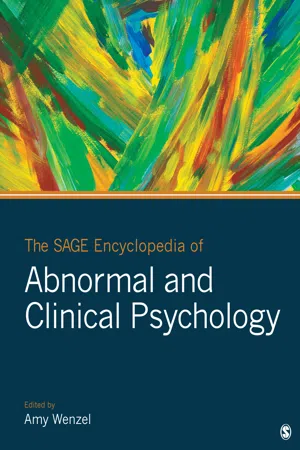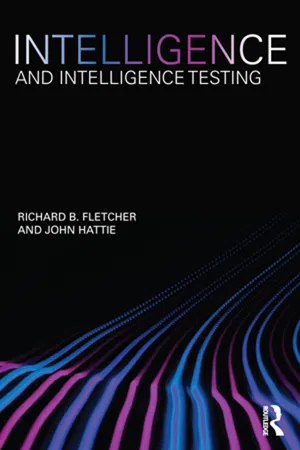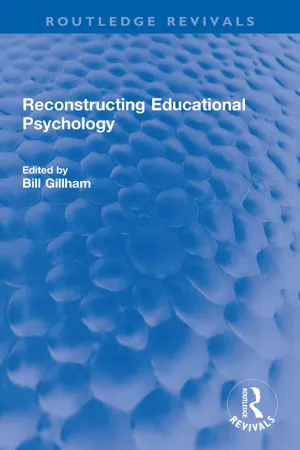Criticism of Intelligence Testing
Criticism of intelligence testing refers to the challenges and concerns raised about the validity, fairness, and cultural biases of traditional intelligence tests. Critics argue that these tests may not accurately measure a person's true cognitive abilities and can be influenced by factors such as socioeconomic status and cultural background. Additionally, critics highlight the potential for intelligence tests to perpetuate stereotypes and inequalities.
7 Key excerpts on "Criticism of Intelligence Testing"
- Bruce B. Frey(Author)
- 2018(Publication Date)
- SAGE Publications, Inc(Publisher)
...A test may be valid for a particular purpose but still result in biased decisions if the results are used improperly or if the results are not interpreted correctly. Therefore, the validity of intelligence tests lies in the decisions that are based on the results. As of 2016, the consensus in the field was to use multiple methods of assessment (e.g. interviews, observations, curriculum-based assessment, and rating scales) with all individuals to gain a broader sense of their functioning instead of solely relying on data gathered from intelligence tests. Strengths and Weaknesses of, and Misconceptions About, Intelligence Tests Intelligence testing is one of the most significant contributions to the field of psychology. Despite controversy over their use, psychologists and educators continue to rely on intelligence testing for many reasons. Intelligence tests predict important outcomes, such as academic achievement, occupational level, and economic success. IQ tests provide a standardized way of comparing an individual with other individuals of the same age. IQ testing can help individuals understand processing strengths and weaknesses and, as mentioned, can assist psychologists in understanding individuals with disabilities. The critical function of IQ may be as a threshold; more specifically, below some very low point on the IQ distribution (<65 or 70), individuals may need additional supports to function as adult members of our society. However, IQ tests provide only a limited understanding of intelligence; many behaviors considered by our society to be “intelligent” behaviors are not tapped by traditional IQ tests. No existing test is capable of adequately measuring the ability to deal with all kinds of situations that require intelligent resolutions. IQ tests can be used to classify or “label” children, possibly limiting their potential freedom to choose courses of study. The IQ can sometimes be misused as a measure of innate or inborn capability...
- Amy E. Wenzel(Author)
- 2017(Publication Date)
- SAGE Publications, Inc(Publisher)
...W. Grant Willis W. Grant Willis Willis, W. Grant Intelligence Tests Intelligence tests 1855 1859 Intelligence Tests There are many different kinds of intelligence (IQ) tests, both individually and group administered, and a search of the Mental Measurements Yearbook With Tests in Print under the general topic of “IQ tests” yields well over 100 entries of these assessments of intellectual functions. Clearly, mental ability tests are widely popular measures in the field of psychology and enjoy a rich tradition. The nature of IQ tests is diverse, and the contexts of their use are diverse as well. Most purport to be objective assessments of aptitude versus achievement. Controversies in the field of IQ testing relate to the degree to which past scholastic achievement influences results as well as potential bias. Of course, all tests include the concept of error variance, but bias differs from error in the sense that error is randomly distributed across all test takers, whereas bias affects selected test takers differentially according to variables such as cultural and language background, ethnicity, gender, and socioeconomic status. Important concepts to consider in the context of intelligence tests include psychometric as well as clinical issues. After discussing these concepts, this entry reviews both individually administered and group-administered tests and presents ethical concerns regarding intelligence tests. Psychometric Issues Psychometrics is a field that is concerned with the veracity of psychological measurement and, as such, focuses on topics such as reliability, validity, and standardization. For an intelligence test to be useful, it first must meet a prerequisite condition of reliability. Reliability refers to consistency of measurement across a variety of conditions such as time, different forms of the test, and homogeneity of items within particular sections of tests...
- eBook - ePub
- Richard Fletcher, John Hattie(Authors)
- 2011(Publication Date)
- Routledge(Publisher)
...Antagonists such as Stephen Jay Gould (1981) have argued that the perniciousness of the IQ testing process means that a single score does not take into account the complexity of the individual and context in which they exist. Above all, Gould argued that IQ tests are simply a tool to maintain the social order by confirming a person’s societal position. After all, there are divisions in society and what better way to highlight these by using a seemingly ‘objective’ measure of ability. In other words, he argued IQ tests are blunt instruments with which to maintain societal order while at the same time allowing one to passively ignore the complex issues and problems that underlie differential levels of ability. If only the debate were so simple. Sure, it is easy to debunk the whole notion of intelligence and the associated methods of assessing it. It is easy to claim that ‘intelligence is what the intelligence test measures’ but that because measurement definitions are so narrow and culturally specific we should ban all intelligence testing. But such an argument is akin to throwing the baby out with the bath water. Most psychologists and psychometricians would agree that intelligence testing has its limitations, but most would also support the notion of intelligence as being a major dimension in an individual’s overall psychological make-up and, therefore, something that should not be ignored (as Wittgenstein commented, ‘The strength of the rope lies not in any one thread but in the overlapping of many fibres’ – intelligence is but one thread). Indeed, measures of intelligence can be important in many ways, as Chapter 4 details. Yes, IQ has had some bad press, and yes, it has not always been used in the most ethical or defensible ways, but the same could be said about personality and many other forms of testing...
- eBook - ePub
- Michael Farrell(Author)
- 2010(Publication Date)
- Routledge(Publisher)
...Chapter 7 Problems with assessment This chapter examines assessments, especially intelligence tests, used in special education. It first considers the nature of intelligence and the characteristics of typical tests of intelligence. The chapter next looks at the assessment of intelligence with regard to reading disorder and to cognitive impairment. It then reviews criticisms of intelligence and its assessment that: • the concept of intelligence and its testing are determinist; • intelligence is associated with separate lower status schooling for some pupils; • there are better alternatives. The nature of intelligence and characteristics of tests Intelligence has been said to concern various abilities. These are the ability to ‘understand complex ideas’, ‘adapt effectively to the environment’, ‘learn from experience’, ‘engage in various forms of reasoning’ and overcome obstacles by thinking about them (American Psychological Association Task Force, 1995). Individuals differ from one another in these abilities. If this conceptual outline is accepted, it follows that intelligent activity would involve related features such as seeing the essentials in a given situation and responding appropriately to them. There is debate about what responding appropriately might mean and what samples of such behaviour might be suitable to form part of any assessments of intelligence. When intelligence tests are administered, there tend to be variations in the scores of the subtests that contribute to the overall score. Nevertheless, the scores on these sub-tests tend to correlate positively, so that a person who scores highly on one sub test tends to score highly on others. Interpretations of the structure of intelligence have been informed by statistical methods used in interpreting data. The technique of factor analysis and different methods of ‘factoring’ the correlations between sub-tests of intelligence have led to various interpretations of the structure of intelligence...
- eBook - ePub
- Bill Gillham, Bill Gillham(Authors)
- 2022(Publication Date)
- Routledge(Publisher)
...6 THE FAILURE OF PSYCHOMETRICS DOI: 10.4324/9781003279853-6 Bill Gillham In the late seventies few psychologists give an intelligence test without a sense of unease, without a note of apology (or defensiveness) as if engaging in some shameful act. This is a most remarkable change and comparatively recent as a widespread phenomenon. Although partly a response to the Zeitgeist of liberal prejudice it is mainly due to an increasing awareness amongst psychologists of the conceptual and practical limitations of traditional tests. The arguments against the utility of intelligence tests have been around for a long time. Simon’s Intelligence Testing and the Comprehensive School was published in 1953 and, after twenty-five years, is still the best critique of psychometric concepts of intelligence. During the ensuing decade a number of important papers and books were published dismissing notions which had endured since the days of Lewis Terman — intelligence as ‘capacity’, intelligence as distinct from ‘attainments’, intelligence as a stable and relatively unteachable quality (Pidgeon and Yates, 1956; Vernon, 1958; Crane, 1959; Liverant, 1960; Hunt, 1961). Yet for a long time the practice of intelligence testing seemed little affected by these criticisms — one manifestation of the durability of powerful, simple and easily communicated ideas. As late as 1965 Holtzman, writing about the concept of intelligence, could say that ‘one of the most significant accomplishments of psychology has been the development of tests for measuring intelligence’ (Brim et al., 1966). Finishing my training as an educational psychologist in that year I am sure that I would have agreed with Holtzman. I can certainly remember being pleased to hear that a large-scale project was being set up at the University of Manchester to develop a British Intelligence Scale...
- Nancy Fenton, Jessica Flitter(Authors)
- 2015(Publication Date)
- Research & Education Association(Publisher)
...Chapter 13 Testing and Individual Differences Our society believes that intelligence is very important; in fact, intelligence tests are used to decide what schools people may attend, what jobs they are qualified for, and whether or not they are capable or brilliant. Interestingly, psychologists generally cannot agree on what exactly intelligence is or an effective way that it can be measured. Experimental psychologist E.G. Boring once famously declared, “Intelligence is what intelligence tests measure.” If that were the only meaning of intelligence, no one but psychologists would care about it. Broadly defined, intelligence involves the capacity to acquire knowledge, reason effectively, and adapt to one’s surroundings by utilizing a combination of inherited abilities (nature) and learned experiences (nurture). Intelligence may be described as a collection of separate abilities or as one significant factor. The study of intelligence is closely related to the field of psychometrics, or the scientific study of using mathematical or numerical methods to measure psychological variables by creating reliable and valid tests. Psychometrics involves the use of a mathematical concept called factor analysis, which utilizes statistics to reduce the number of variables by placing them in clusters of related items. This technique can be used to determine groups of similar variables on a test to determine if an individual’s score on a measure of intelligence is related to one type of ability (factor) or many. In regard to intelligence, it is important that you are able to describe the main theories, the history of testing, and the elements of strong test construction. Intelligence Theories As psychologists have researched intelligence, a variety of different theories have been proposed to explain how intelligence can be defined and potentially measured. The theories differ in terms of how they explain the overall concept...
- Daniel Thomas Cook(Author)
- 2020(Publication Date)
- SAGE Publications Ltd(Publisher)
...Susan J. Atkinson Susan J. Atkinson Atkinson, Susan J. Intelligence Testing Intelligence testing 977 982 Intelligence Testing ‘Intelligence testing’ is widely used to measure cognitive ability. Tests used can measure verbal ability or non-verbal, abstract reasoning skills. Published tests are used in educational, health, and occupational settings for selection purposes or to measure mental functioning following illness or trauma. There are also many tests available online which individuals may choose to do for personal information, although these may be of dubious reliability. This entry summarises the development of intelligence testing and discusses issues with this approach to measuring intelligence. This entry further outlines attempts to create culture-free and culture-fair tests. This entry concludes by exploring several contemporary approaches to intelligence testing. The History and Development of Intelligence Testing The psychometric approach to intelligence focuses on the measurement of intelligence using tests. Assumptions are that intelligence is a single measurable entity; that people are born with a certain amount of intelligence which it is difficult to alter; and that IQ tests can reliably measure that intelligence. The development of psychometric intelligence testing was driven by a desire to apply scientific principles to human behaviour and to ‘prove’ the superiority of White Western males in an apparently objective way...






